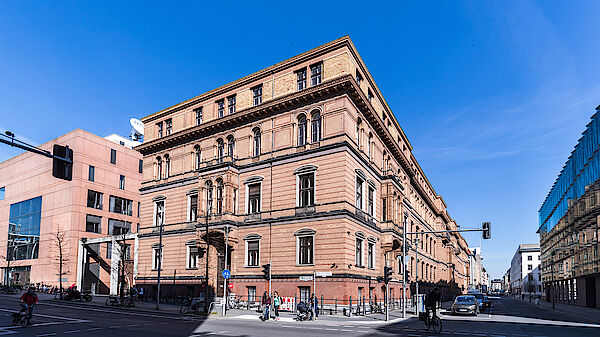
About us
The Einstein Center Digital Future (ECDF) is the center for digitalization research in Berlin. It is based on a large-scale public-private partnership (PPP) model between more than 30 companies, organizations, all four Berlin universities, the Charité – Universitätsmedizin Berlin and more than ten other of Berlin’s research institutions. With 38.5 million euros in funding, ECDF aims to connect Berlin’s actors in the field of digitalization, test new forms of cooperation, foster innovative and interdisciplinary research, and to attract excellent junior scholars from around the world.
The ECDF was approved by the Einstein Foundation Berlin in September 2016 after extensive review. Since its opening on April 3, 2017, scientists have been conducting research in the areas of 1) digital infrastructure, methods, and algorithms, 2) digital health, 3) digital society, as well as 4) digital industry and services. In April 2023, after a successful evaluation by an international expert panel, the ECDF entered its second funding phase. Until March 31, 2028, ECDF and its researchers focusses on three areas in the field of digitalization:
// Transforming Communities concerns research on the impact of digitalization on individuals, groups, organizations, and society at large. In particular, it addresses three overarching questions: How does digitalization transform organizations and markets? How does digitalization change individual skills and preferences? How does digitalization cater to the needs, aspirations, and ambitions of particular communities?
// Integrated Health relates not only to individual well-being but takes into account how their environment and community affect people’s health. Research in this area focusses on the topics of “Digital health data applications” and “Data visualization and decision support.”
// Sustainable cities: Digital technologies currently play and will continue to play a key role in shaping future cities and the built environment as “intelligently networked” environments. ECDF’s research on sustainable cities is going to investigate how digital technology can help shape future cities into sustainable, safe, connected, and human-centered environments.
Vision
The Einstein Center Digital Future (ECDF) is an enabler and accelerator for research in the field of digitalization in Berlin. We provide orientation in the disruptive digital transformation by thinking outside the box, empowering evidence-based research, and pursuing a holistic approach to current global challenges. We engage in critical debates on the overarching questions: What are our shared goals for the digital transformation? What future society do we envision, and what values will it be built upon? And how can we, as researchers, contribute to that vision? Considerable challenges therefore lie ahead of us. To shed light on how the answers will influence the digital infrastructure of the future, our aim is to create a research environment, overcoming traditional, faculty-based silos. We are working toward a shared vision of a future research landscape where experts from different fields address today’s challenging questions in an agile, interdisciplinary, and inspiring way. These are the pillars of our shared vision:
- Digitalization for everyone: We are currently facing a widening digital gap, and more and more people are afraid of losing their place in our rapidly changing society as a result. We want to include everyone in the digital transformation and to help shape a shared vision of tomorrow’s society. We want people from all backgrounds to take part in discussions on technology, on the aims of digitalization, and on questions that challenge fundamental principles of today’s society.
- Digitalization beyond silos: Digitalization affects all areas of our daily lives and transcends disciplinary boundaries and established fields of expertise in new and unpredictable ways. Our scientists and researchers are grouped around cross-cutting topics and not along the lines of traditional scientific disciplines. We believe that ECDF serves as a role model for a future interdisciplinary and rapidly evolving faculty that complements traditional university structures.
- Human-centered digitalization: Digitalization will transform all aspects of human life and activity. We follow a vision of digitalization that not only seeks to optimize the efficiency of its solutions, but one that remains in service to people, a digitalization that strengthens human rights and improves human welfare. In this context, it is vital to provide easy access to trustworthy, diversified information, and non-patronizing services that support freedom of choice and preserve privacy while ensuring non-discriminatory treatment and participation in governance.
- Open science: Enabling access to knowledge and open data is a key principle of the ECDF. We act responsibly and courageously, are open to new ideas, and design our processes to be transparent and equitable to all.
- Sustainable digitalization — and digitalization for sustainability: we believe that technology is key to support the development of solutions to address global climate and socio-environmental challenges. At the same time, sustainability criteria should also drive and be used to assess technological development.
The Robert-Koch-Forum is our open House of Digitalization in the heart of Berlin and hosts excellent scientists from all over the world, providing a space for their ideas on how digitalization can be researched, designed, and implemented. We work with real data on existing infrastructures, simulations, and applications in a dialogue with citizens. We act responsibly and courageously, are open to new ideas, and design our processes to be transparent and equitable to all. We follow an Open Science agenda in which enabling access to knowledge and open data is a key principle. We foster interdisciplinary research projects in order to provide a holistic view of the current demanding challenges that a digital world creates. We want to inspire our researchers to make meaningful contributions to the societal discourse on our future.
